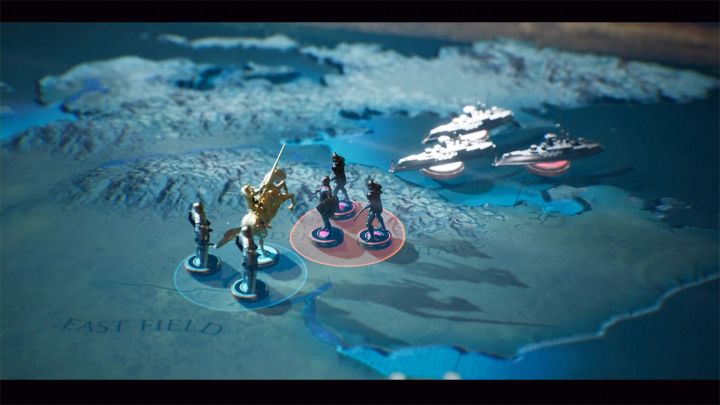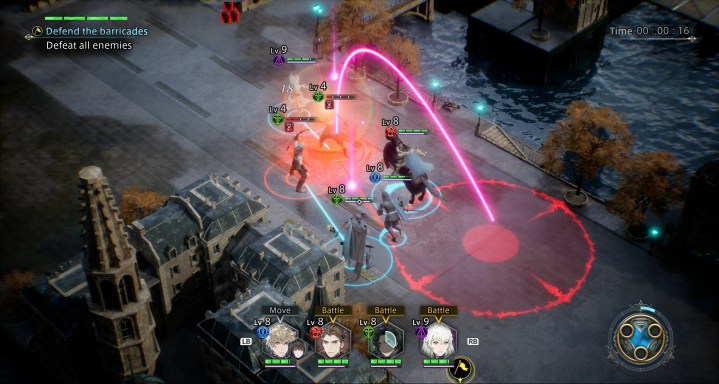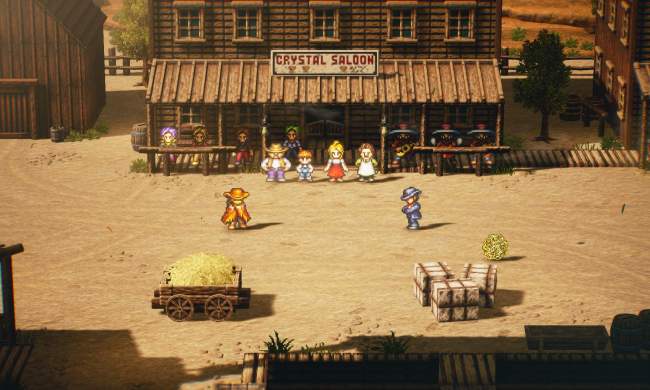“The DioField Chronicle includes a lot of setup for potential sequels, but it does a solid job of laying down the proper foundation to make that work long-term.”
- Interesting personal conflicts
- Tactical battle system
- Thoughtful sidequests
- Compelling groundwork for a series
- Enemy and mission variety is lacking
- Animations are janky
- Progression and pacing issues
Square Enix has recently been keen to publish more middle-tier Japanese games, including the likes of Valkryie Elysium, Tactics Ogre: Reborn, and Harvestella, all of which are coming out within mere weeks of each other. The publisher seems to be all-in on new IPs, bolstering its reliable roster of surefire RPG hits. The DioField Chronicle is an important part of that strategy.
The DioField Chronicle is a new IP from developer Lancarse and publisher Square Enix that blends a political war story with real-time strategy combat. It doesn’t seem like a one-off deal for Square Enix; everything from the game’s story to its characters screams setup for a potential sequel. This could be the beginning of Square Enix’s next big IP, so long as players are willing to be early adopters.
Despite some missteps along the way, The DioField Chronicle creates a solid foundation for a potential series with its engaging battle system and interesting cast of characters. If this is the start of a new franchise, its future can only get brighter from here.
Political backdrop
The RPG’s story takes place on the Island of DioField, which is rich with deposits of the natural resource Jade. Different nations are interested in Jade, including the Trovelt-Schoevian Empire, the Rowtale Alliance, and the Kingdom of Alletain. When the Alliance is defeated in war by the Empire, the latter turns its sights to Alletain. A mercenary group, the Blue Foxes, works closely with Alletain to take care of various requests from the royal government, which includes pushing back against the Imperial forces. The four heads of the Blue Foxes are Andrias Rhondarson, Fredret Lester, Iscarion Colchester, and Waltaquin Redditch.

What makes the Blue Foxes interesting are the ideals that each of the heads holds, and how they conflict with one another. For example, Lester believes that only a king is able to lead commoners to prosperity, while Colchester is an advocate of democracy. During missions that require quelling class rebellions and riots, they butt heads over whether commoners looting an area justifies using force.
The way the story is told is similar to Triangle Strategy, another Square Enix-published strategy game that launched this year. Between story missions, there’s a narrator that explains major plot events with book-like illustrations. While this approach is more telling rather than showing, it contrasts with the actual cutscenes that focus on the dynamics between the heads of the Blue Foxes.
I’ve bought in enough to see how future stories within the DioField universe could build on them.
Later on in the story, the political tensions between Alletain and the Empire take a back seat in favor of the interpersonal quarrels between the Blue Foxes’ heads. Certain plot twists and irreconcilable differences between them drive the plot forward and keep it engaging at a more personal level, as opposed to a grander lore one.
At certain points, some characters have a falling out with each other. Despite these conflicts, the characters make sure the player knows that this isn’t the last time you’ll see them—this definitely screams sequel bait. That can be a little annoying because it results in some unresolved plot threads. However, the characters have cogent reasons for being disillusioned by what the Blue Foxes group has become and I’ve bought in enough to want to see how future stories within the DioField universe could build on them.
Fire Emblem: Blue Foxes
DioField’s gameplay consists of real-time strategy battles and conversations with party members outside of combat. During missions, you can deploy a total of eight units, four of which are the main units that you can control. The other four are subunits that don’t participate directly, but you can call on their support and special skills.
I do wish that there was more variety in the types of enemy units and mission objectives.
It’s an engaging battle system that required me to be tactical about where I sent my units. I could either focus all four on a single target or split them between different enemies. Additional rewards (skill points, materials, etc). are earned by completing different side objectives during missions, such as preventing any allies from being knocked out, finding the treasure chest located on the battlefield, and finishing the fight within a certain time limit.
I do wish that there was more variety in the types of enemy units and mission objectives. While there are escort missions every now and again, they’re very few in number and most missions boil down to just eliminating every single enemy unit. Even so, the cinematic that plays when activating special skills is a treat. Each character class has an ultimate skill that transitions into a cutscene. A personal favorite is the Cavalier’s Lance Strike that grabs the enemy, launches them into the air, and slams them into the ground, causing spikes from the earth to protrude and damage other enemies within the attack’s radius.

Upgrading weapons and skills is a relatively straightforward process. The standard reward for completing missions is gold, which can be used to enhance certain facilities to provide access to more weapons and skills. The progression is a bit lopsided, though. In the early and middle parts of the story, I sometimes felt like I wasn’t strong enough and had to grind a few side missions to afford new gear. However, by the time I reached the end game, I was swimming in more gold than I knew how to spend.
The side missions themselves provide good characterization and backstories between Rhondarson and the plethora of other party members. They’re reminiscent of Fire Emblem’s Support Conversations or Persona’s Social Links. For example, one side mission had me take down assassins that the church had hired because one of my party members was a defected member. Another party member, hungry for revenge, wanted to massacre the entire population of a fishing village because their old political enemies resided there, despite some of them turning over new leaves and even starting families.
A bit dull, innit
The members of the Blue Foxes reside in a base called Elm Camp, and that’s where almost all of the side missions and conversations take place. The area reminds me of the Garreg Mach Monastery hub in Fire Emblem: Three Houses, except that Elm Camp feels much less alive due to it being a low-key mercenary base rather than a full-fledged school with teachers. There’s only the minimum number of NPCs needed for things like shops and upgradeable facilities.
The DioField Chronicle is a promising new IP that has many good ideas anchored by an engaging battle system and character dynamics.
It doesn’t help that the game’s color palette in Elm Camp is rather muted. I don’t expect the characters to have toothpaste-colored hair like Fire Emblem Engage’s new protagonist. That would clash with the overall gritty tone of the game, but I feel like some brighter colors here and there would have helped make it feel more visually distinct.
While I love the character portraits, drawn in the beautiful and distinct Final Fantasy style by Isamu Kamikokuryo, the 3D character models and animations outside of battle could have used a bit more work. Their faces look oddly porcelain and doll-like, most notably during cutscenes. And Rhondarson’s walking and running animations around Elm Camp look like he always has a pebble stuck in his shoe or he has to quickly find the nearest bathroom.

Even with those artistic shortcomings, The DioField Chronicle is a promising new IP that has many good ideas anchored by an engaging battle system and character dynamics. It’s very clear that Lancarse wants to expand the game’s world and lore, and there’s definitely potential here. If a more polished sequel addresses some of the gameplay and progression issues, then the Blue Foxes’ next adventure will be one to look out for.
The DioField Chronicle was reviewed on PS4.





